This year has brought extreme heat waves, wildfires and toxic air pollution to every continent. This changing climate produces real-life emergencies. In September, Greece had just had three feet of rain over four days, destroying much of its agricultural crops and Libya just suffered a disaster on a catastrophic scale, with fears that 20,000 have died.
This is why Greenpeace offices and supporters joined a global mobilisation to end the Fossil Fuel era.
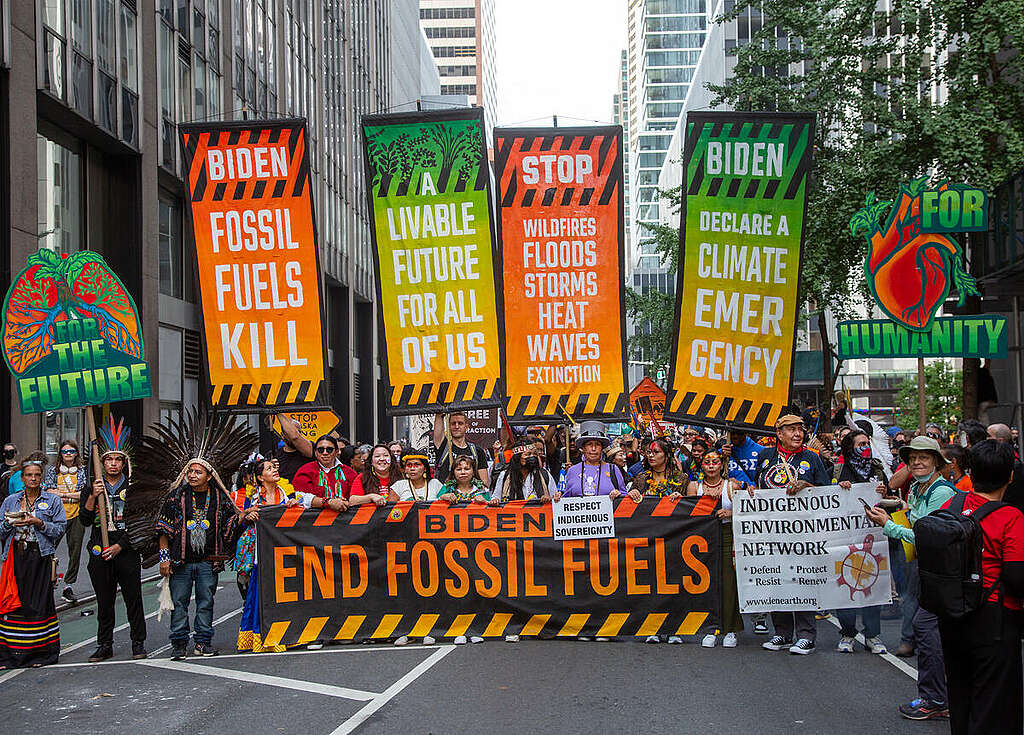 Indigenous leaders kick off the march.
Thousands gathered in New York City for the “March to End Fossil Fuels” in the lead up to the UN Climate Ambition Summit on September 20th. Protestors called on President Biden and global leaders to phase-out fossil fuels and jumpstart a fair and just transition to renewable energy. © Tim Aubry / Greenpeace
Indigenous leaders kick off the march.
Thousands gathered in New York City for the “March to End Fossil Fuels” in the lead up to the UN Climate Ambition Summit on September 20th. Protestors called on President Biden and global leaders to phase-out fossil fuels and jumpstart a fair and just transition to renewable energy. © Tim Aubry / GreenpeaceWith over 700 marches and other actions in more than 60 countries and 600,000 participants worldwide 15-17 September, the global climate movement is more diverse and united than ever before. The main event was a climate march in New York City, where world leaders are gathering for the UN General Assembly and the UN Secretary General is convening a “no-nonsense” Climate Ambition Summit.
Ahead of the march, Ebony Twilley Martin, Executive Director at Greenpeace USA, said “ During this climate week, we say it loud so that everyone hears: we MUST phase out oil and gas. We must phase out fossil fuels. We march together because time is a luxury we can’t afford. We march for our future.”
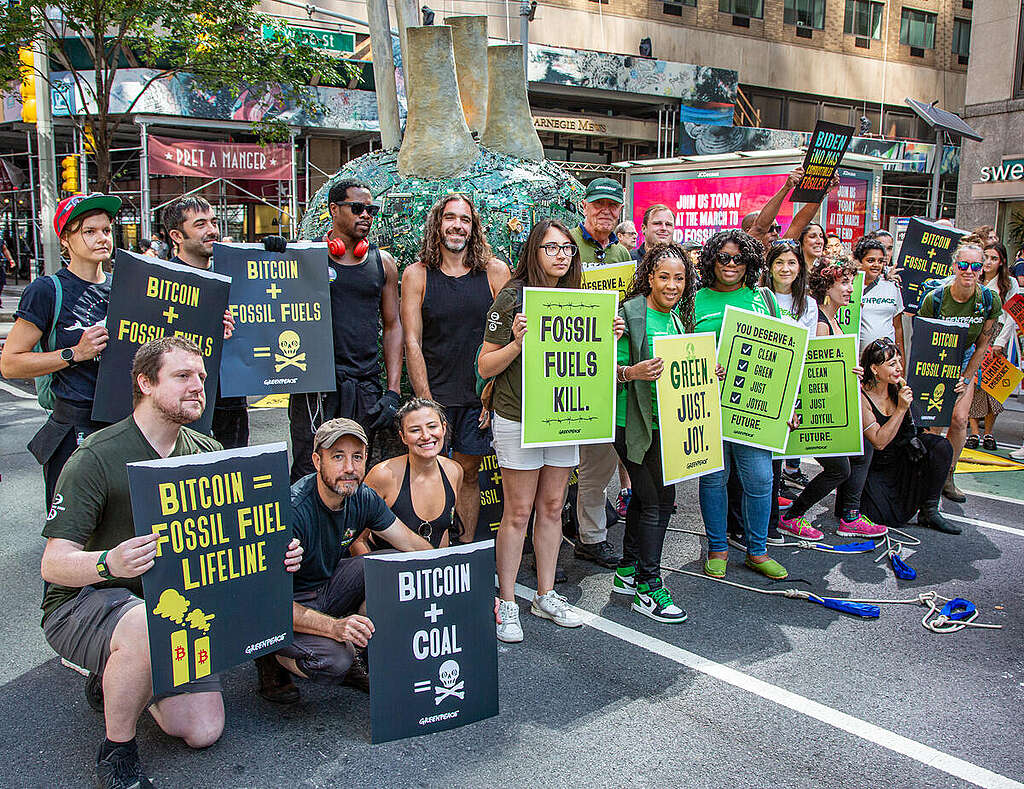 Greenpeace activists gather in front of the Greenpeace Bitcoin skull and a Greenpeace digital ad running in the background during the march as
thousands gathered in New York City for the “March to End Fossil Fuels” in the lead up to the UN Climate Ambition Summit on September 20th. Protestors called on President Biden and global leaders to phase-out fossil fuels and jumpstart a fair and just transition to renewable energy. © Tim Aubry / Greenpeace
Greenpeace activists gather in front of the Greenpeace Bitcoin skull and a Greenpeace digital ad running in the background during the march as
thousands gathered in New York City for the “March to End Fossil Fuels” in the lead up to the UN Climate Ambition Summit on September 20th. Protestors called on President Biden and global leaders to phase-out fossil fuels and jumpstart a fair and just transition to renewable energy. © Tim Aubry / GreenpeaceFollowing the Africa Climate Summit in Nairobi at the start of September, Greenpeace Africa marched in eight cities in Cameroon, the Democratic Republic of Congo, Kenya, and South Africa. In Durban, Greenpeace activists who collected plastic waste reminded us: “99% of plastics are made from oil & gas. End plastic pollution. End fossil fuels.”
“Some African countries with the least energy supply are the richest with oil reserves. And many peaceful and biodiverse regions have plunged into conflict with the coming of big oil. For the thousands of African youth marching to end fossil fuel expansion and the neo-colonial extraction that deepens hardship for African communities, this is a fight for their survival. It is a fight for our lives and wellbeing. And it’s a fight they must win.”
-Dr. Oulie Keita, Executive Director of Greenpeace Africa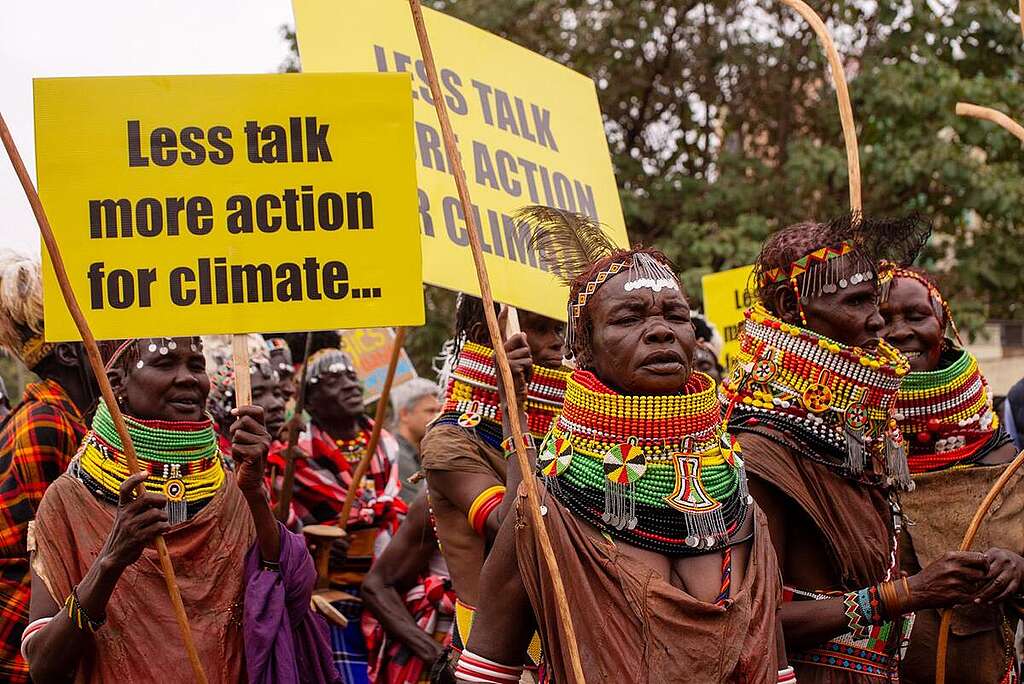 Climate activists take to the streets at the Africa Climate Summit in Nairobi, Kenya, urging the African Union to lead by example and protect African biodiversity, end fossil fuels driving catastrophic climate change and invest in real solutions by shifting to solar and wind energy. Signs read “Less talk more action for Climate”. © Greenpeace
Climate activists take to the streets at the Africa Climate Summit in Nairobi, Kenya, urging the African Union to lead by example and protect African biodiversity, end fossil fuels driving catastrophic climate change and invest in real solutions by shifting to solar and wind energy. Signs read “Less talk more action for Climate”. © Greenpeace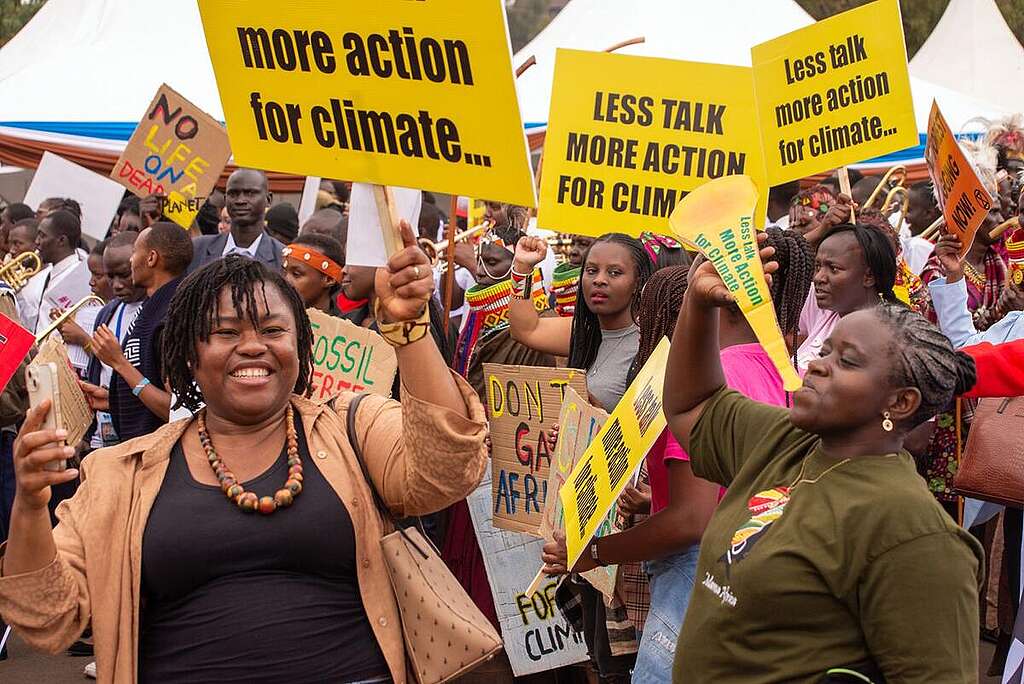 Climate activists take to the streets at the Africa Climate Summit in Nairobi, Kenya, urging the African Union to lead by example and protect African biodiversity, end fossil fuels driving catastrophic climate change and invest in real solutions by shifting to solar and wind energy. Signs read “Less talk more action for Climate”. © Greenpeace
Climate activists take to the streets at the Africa Climate Summit in Nairobi, Kenya, urging the African Union to lead by example and protect African biodiversity, end fossil fuels driving catastrophic climate change and invest in real solutions by shifting to solar and wind energy. Signs read “Less talk more action for Climate”. © GreenpeaceIn Europe, signs were raised across the continent, calling to “End fossil crimes now!”.
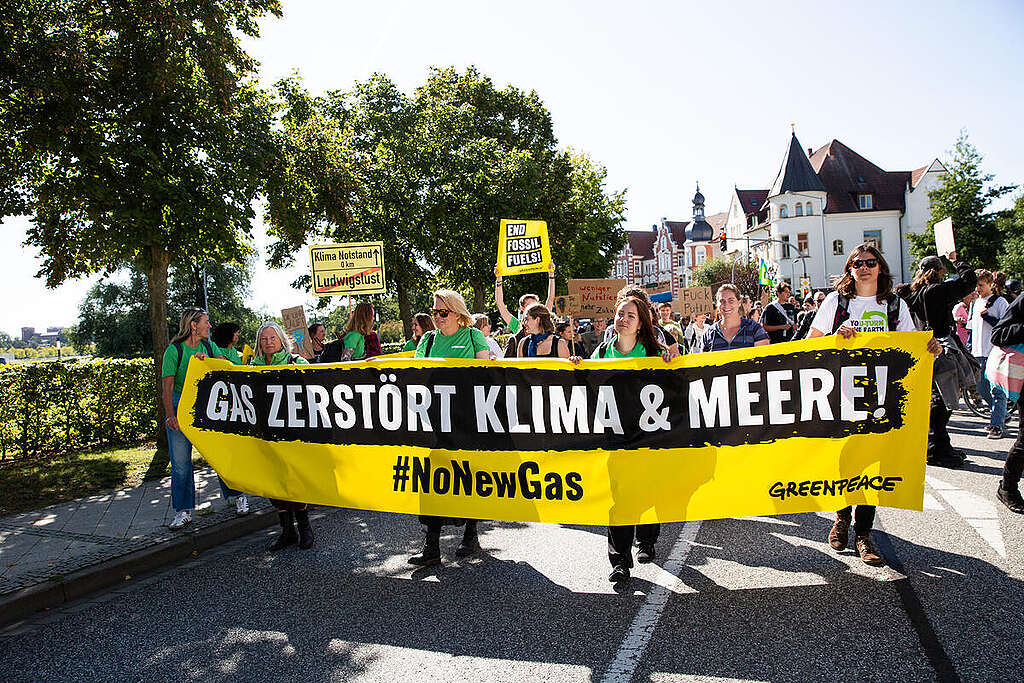 Greenpeace activists along with the Fridays for Future, other Civil Society groups and the climate justice movement for a gas phase-out, hold a demonstration on the street all across Germany, to call out the German government’s gas policy in pushing ahead with new gas projects such as Borkum, Australia and Senegal, and for putting our environment to danger and for fuelling the climate crisis. © Lucas Wahl / Greenpeace
Greenpeace activists along with the Fridays for Future, other Civil Society groups and the climate justice movement for a gas phase-out, hold a demonstration on the street all across Germany, to call out the German government’s gas policy in pushing ahead with new gas projects such as Borkum, Australia and Senegal, and for putting our environment to danger and for fuelling the climate crisis. © Lucas Wahl / GreenpeaceMira Jäger, energy expert at Greenpeace Germany: “Instead of focusing efforts on expanding renewables, far too much money is still flowing into fossil fuel projects such as oversized LNG infrastructure in Rügen and Wilhelmshaven. In this way, the German government is cementing a dependency on fossil fuel, slowing down the energy transition, and blocking young people’s prospects for a climate-friendly, secure future.”
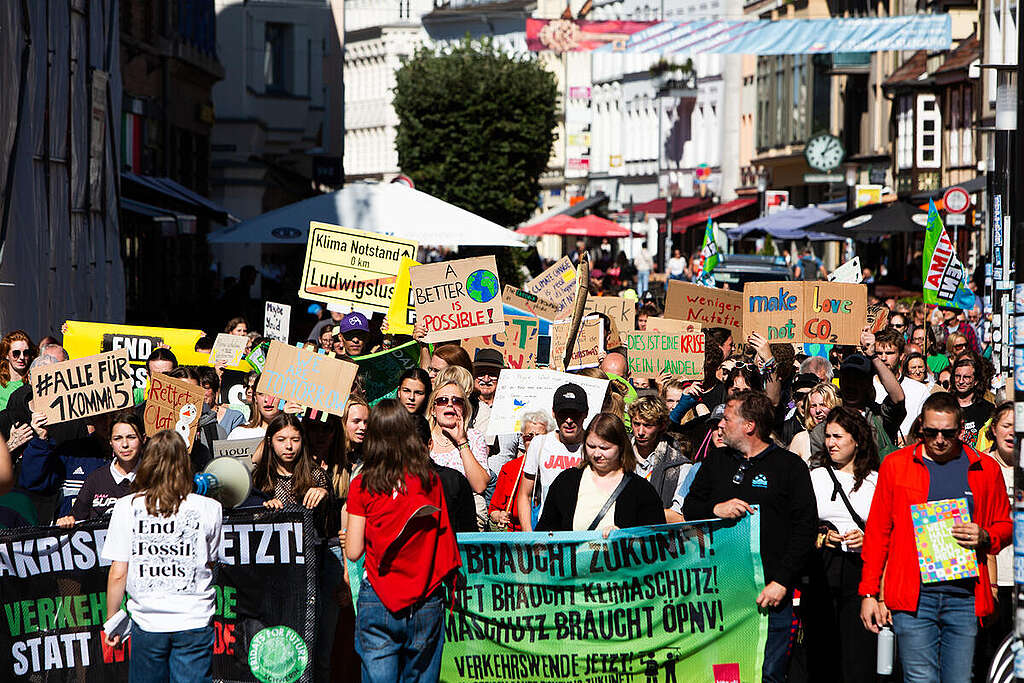 Greenpeace activists along with the Fridays for Future, other Civil Society groups and the climate justice movement for a gas phase-out, hold a demonstration on the street all across Germany, to call out the German government’s gas policy in pushing ahead with new gas projects such as Borkum, Australia and Senegal, and for putting our environment to danger and for fuelling the climate crisis. © Lucas Wahl / Greenpeace
Greenpeace activists along with the Fridays for Future, other Civil Society groups and the climate justice movement for a gas phase-out, hold a demonstration on the street all across Germany, to call out the German government’s gas policy in pushing ahead with new gas projects such as Borkum, Australia and Senegal, and for putting our environment to danger and for fuelling the climate crisis. © Lucas Wahl / GreenpeaceAlin Tănase, with Greenpeace Romania, said: “Offshore gas exploitation – without a climatic, environmental or even an economic justification- is an irreparable mistake, for which we will all have to pay.”
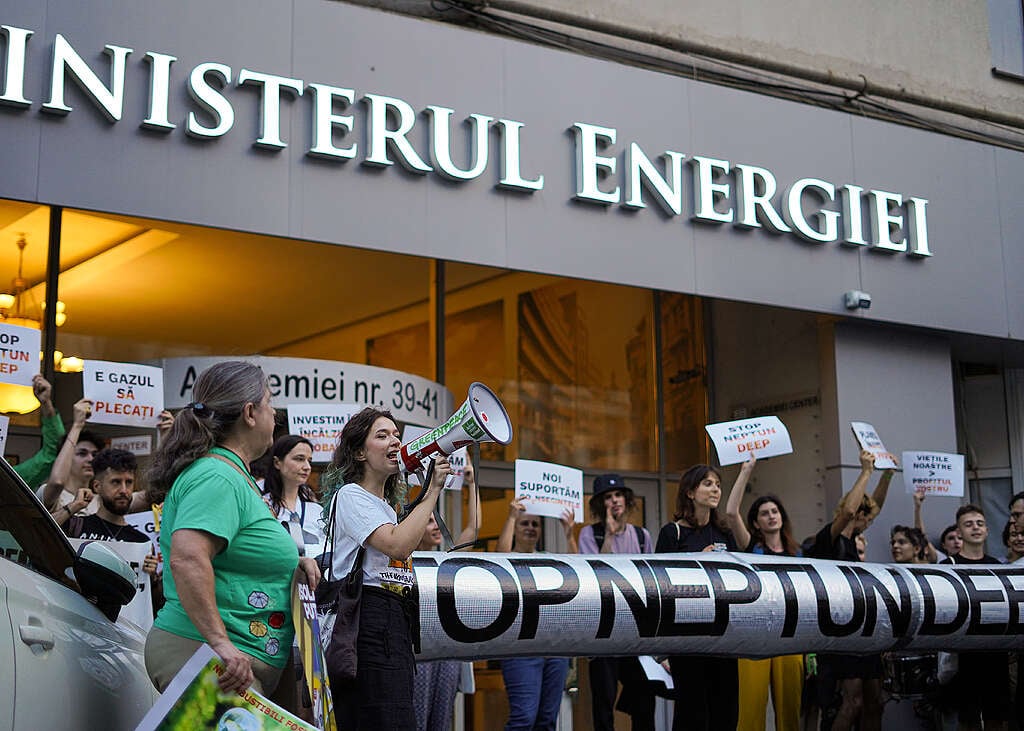
Finally, in East Asia, activists from hundreds of civil society organisations will be taking action on September 23, for an alternative future, in which their countries no longer top the charts in burning coal, gas and oil.
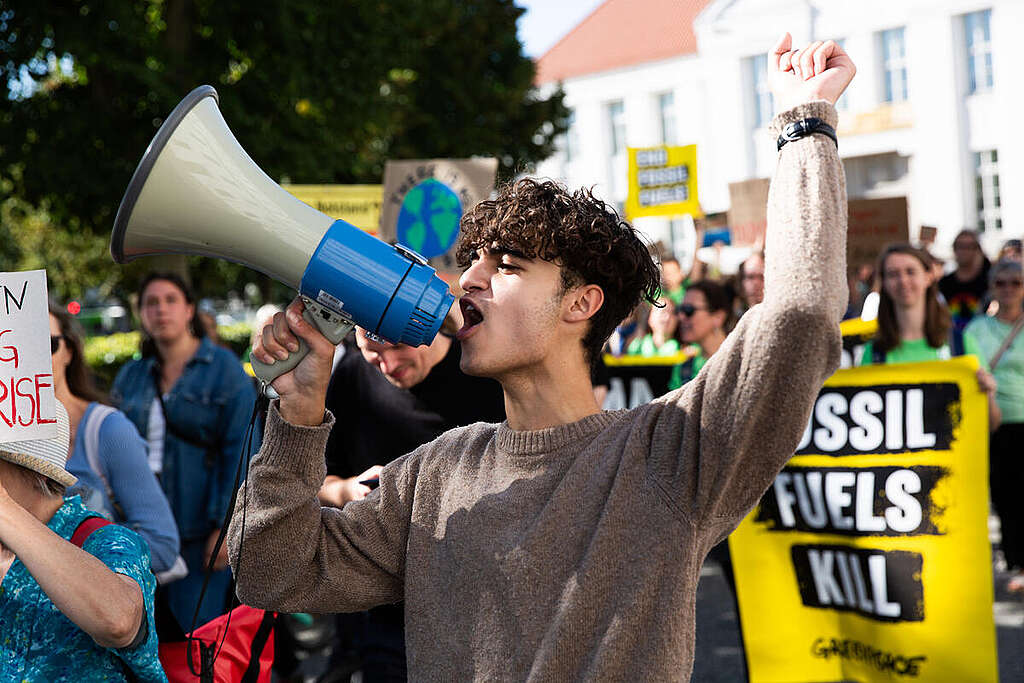 Greenpeace activists along with the Fridays for Future, other Civil Society groups and the climate justice movement for a gas phase-out, hold a demonstration on the street all across Germany, to call out the German government’s gas policy in pushing ahead with new gas projects such as Borkum, Australia and Senegal, and for putting our environment to danger and for fuelling the climate crisis. © Lucas Wahl / Greenpeace
Greenpeace activists along with the Fridays for Future, other Civil Society groups and the climate justice movement for a gas phase-out, hold a demonstration on the street all across Germany, to call out the German government’s gas policy in pushing ahead with new gas projects such as Borkum, Australia and Senegal, and for putting our environment to danger and for fuelling the climate crisis. © Lucas Wahl / Greenpeace“This is a unique demonstration of people power, unity over division, and providing a platform for individuals to voice their aspirations for meaningful change. Our mission transcends mere government criticism: it is about collaboratively forging alternative solutions.” – South Korean Greenpeace Climate and Energy Project Manager, Insung Lee.
This year has been historically hot, polluted and deadly. Yet this global mobilisation can blow a fresh breeze of hope. The climate movement took to the streets and won’t budge until we end fossil fuels for good.
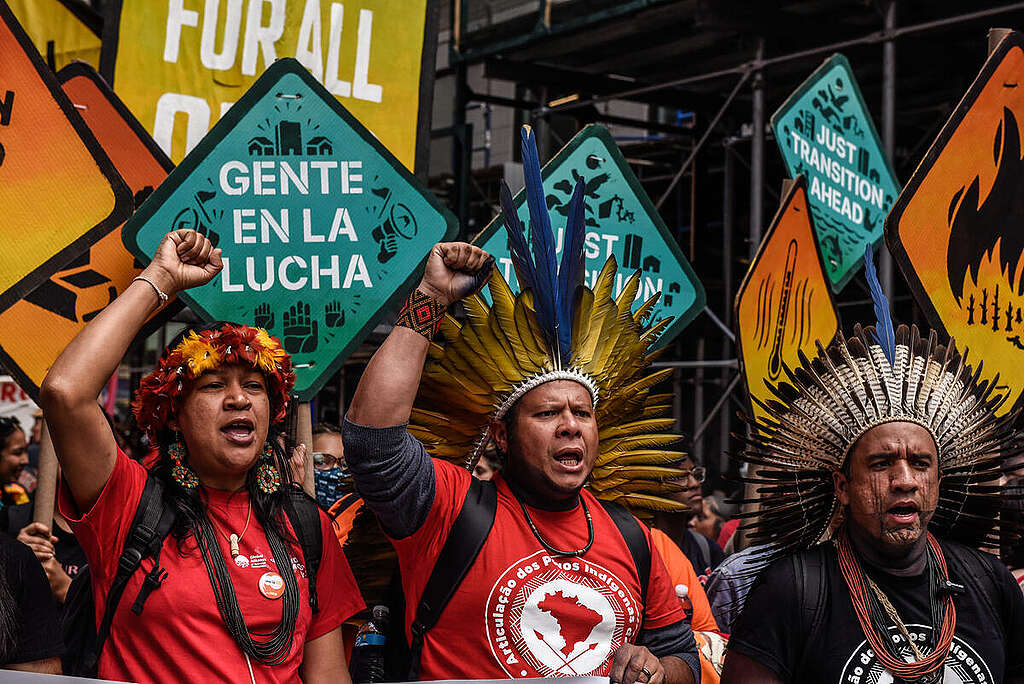 Thousands gathered in New York City for the”March to End Fossil Fuels” in the lead up to the UN Climate Ambition Summit on September 20th. Protestors called on President Biden and global leaders to phase-out fossil fuels and jumpstart a fair and just transition to renewable energy. © Stephanie Kieth / Greenpeace
Thousands gathered in New York City for the”March to End Fossil Fuels” in the lead up to the UN Climate Ambition Summit on September 20th. Protestors called on President Biden and global leaders to phase-out fossil fuels and jumpstart a fair and just transition to renewable energy. © Stephanie Kieth / GreenpeaceTal Harris is the Interim Head of Communications for Greenpeace Africa, based in Dakar, Senegal.

 7 months ago
35
7 months ago
35

